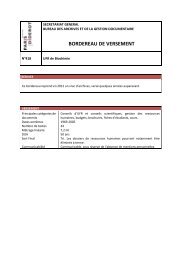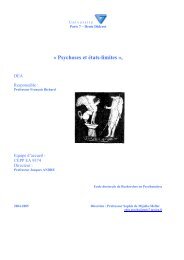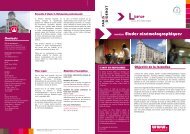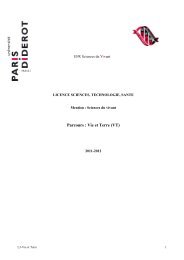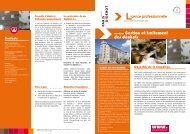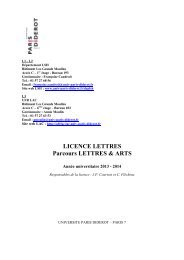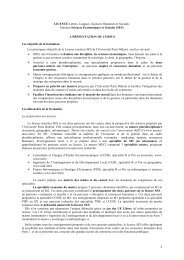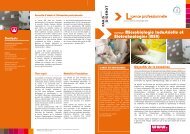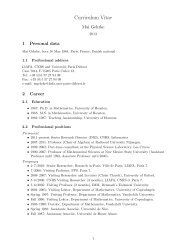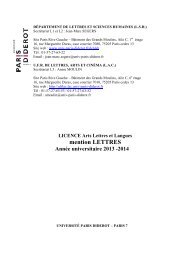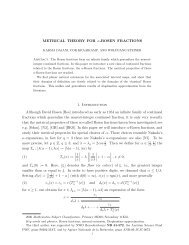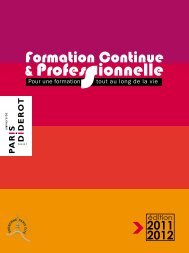Coordinator's names Carole DELPORTE-GALLET Hugues ...
Coordinator's names Carole DELPORTE-GALLET Hugues ...
Coordinator's names Carole DELPORTE-GALLET Hugues ...
You also want an ePaper? Increase the reach of your titles
YUMPU automatically turns print PDFs into web optimized ePapers that Google loves.
Some classical problems, specifying the utilities of agents may be reformulated as equilibria in the sense of<br />
game theory.<br />
Clearly all these objectives are very challenging. For many of them, the current state of art is still rather<br />
primitive. Nevertheless, for most of them a lot of results already exist but generally are not stated in a general<br />
framework of complexity theory for distributed computing. Hence we think that most of the objectives are<br />
reachable and many new results and new insights into complexity theory for distributed computing are<br />
expected from this project.<br />
A crucial aspect of this proposal is that all objectives relate to both communities of Distributed Computing.<br />
Most of the time both communities adopt different approaches to tackle those issues. We expect<br />
the confrontation of these points of view to be valuable and to enable to converge to an outline of a general<br />
complexity and computability theory for distributed computing.<br />
3.2 Description by task<br />
3.2.1 Task 1: Project Management<br />
Coordinator: <strong>Carole</strong> Delporte-Gallet et <strong>Hugues</strong> Fauconnier (Paris)<br />
Local coordinators: David Ilcinkas (Bordeaux) et Achour Mostéfaoui (Rennes)<br />
The success of the project is crucial to an intensive collaboration between the three sites, involving<br />
frequent meetings and inter-site visits. DISPLEXITY is therefore planing four 2-day meetings every year<br />
during which all partners will present their most recent results related to the project. One of these meetings<br />
will be dedicated to the compilation of the results achieved during the year, to make sure that all partners<br />
synchronize. All dates for deliverables will fit with the dates of these annual special meetings.<br />
In addition, our budget requests a grant for a 1-week visit per year per permanent member (that can be<br />
used by the member himself or by his students). The coordinators of the project will pay a specific attention<br />
that frequent exchanges between the partners are done.<br />
The management of the web page of the project will play an important role. Indeed, the fundamental<br />
nature of the project requires that the results will be made available to the community as quickly as possible.<br />
Our web page will be a repository for preliminary versions of papers by the partners, enabling rapid diffusion<br />
of our preliminary results inside the project (via a private web site), and a rapid advertising of the finalized<br />
results outside the project (via a public web site).<br />
Scientific tasks<br />
Since the project is oriented toward fundamental research, the quality of the project will be evaluated by<br />
the ability of the partners to present and advertise their results in the most appropriate and prestigious<br />
conferences of the field.<br />
It should be noted that following the philosophy of the project, all the partners are included in all the<br />
tasks.<br />
3.2.2 Task 2: “yes-no” and Decision Problems in Distributed Computing<br />
Coordinator: Corentin Travers (Bordeaux)<br />
The overall objective of this task is the study of different settings for tackling decision problems in the<br />
various frameworks of distributed computing. As discussed in the general description of the project, we<br />
will mostly focus on a notion of decision defined as follows. Given a specification L (a specification can be<br />
formalized as a language-membership), deciding L is defined by the following two requirements:<br />
• If the inputs of the nodes satisfy L then all nodes must output “yes”;<br />
• Otherwise at least one node must output “no”.<br />
8



